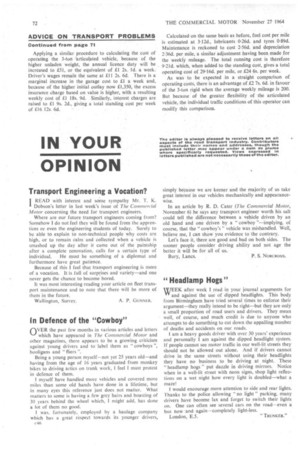IN YOUR OPINION
Page 74

If you've noticed an error in this article please click here to report it so we can fix it.
Transport Engineering a Vocation?
I READ with interest and some sympathy Mr. T. K. I Dobson's letter in last week's issue of The Commercial Motor concerning the need for transport engineers.
Where are our future transport engineers coming from? Somehow I do not feel they will be found from the apprentices or even the engineering students of today. Surely to be able to explain to non-technical people why costs are high, or to remain calm and collected when a vehicle is smashed up the day after it came out of the paintship after a complete renovation, calls for a certain type of
individual. He must be something of a diplomat and furthermore have great patience.
Because of this I feel that transport engineering is more of a vocation. It is full of surprises and variety—and one never gets the chance to become bored.
It was most interesting reading your article on fleet transport maintenance and to note that there will be more of them in the future.
Wallington, Surrey. A. P. GUNNER.
In Defence of the "Cowboy"
nVER the past few months in various articles and letters which have appeared in The Commercial Motor and other magazines, there appears to be a growing criticism against young drivers and to label them as "cowboys ", hooligans and "fliers ".
Being a young person myself—not yet 25 years old—and having from the age of 16 years graduated from monkey bikes to driving attics on trunk work, I feel I must protest in defence of them.
I myself have handled more vehicles and covered more miles than some old hands have done in a lifetime, but in many eyes this reference just does not matter. What matters to some is having a few grey hairs and boasting of 30 years behind the wheel which, I might add, has done a lot of them no good.
I was, fortunately, employed by a haulage company which has a great respect towards its younger drivers, c46 simply because we are keener and the majority of us take great interest in our vehicles mechanically and appearancewise.
In an article by R. D. Cater (The Commercial Motor, November 6) he says any transport engineer worth his salt could tell the difference between a vehicle driven by an old hand and one driven by a "cowboy "—implying, of course, that the " cowboy's " vehicle was mishandled. Well, believe me, I can show you evidence to the contrary.
Let's face it, there are good and bad on both sides. The sooner people consider driving ability and not age the better it will be for all of us.
Bury, Lancs. P. S. NORCROSS.
"Headlamp Hogs"
WEEK after week I read in your journal arguments for " and against the use of dipped headlights. This body from Birmingham have tried several times to enforce their argument—they really intend to be right—but they are only a small proportion of road users and drivers. They mean well, of course, and much credit is due to anyone who attempts to do something to cut down the appalling number of deaths and accidents on our roads.
am a heavy goods driver with over 30 years' experience and personally I am against the dipped headlight system. If people cannot see motor traffic in our well-lit streets they should not be allowed out alone. And if drivers cannot drive in the same streets without using their headlights they have no business to be driving at night. These "headlamp hogs" put dazzle in driving mirrors. Notice when in a well-lit street with neon signs, shop light reflections on a wet night how every light is doubled—what a maze!
I would encourage more attention to side and rear lights. Thanks to the police allowing " no light" parking, many drivers have become lax and forget to switch their lights on. One can often see several cars on the road—even a bus now and again—completely light-less.
London, E.5. " TRUNKER."
















































































































